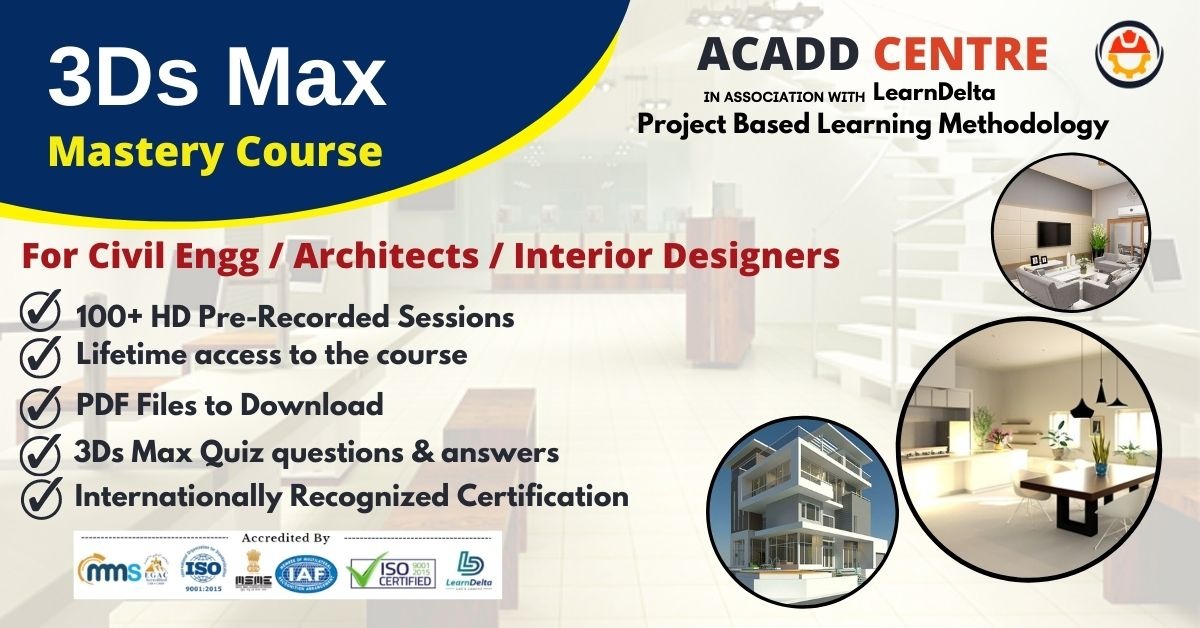There are no items in your cart
Add More
Add More
| Item Details | Price | ||
|---|---|---|---|
4.9 (150 ratings)
6545 learners enrolled
Language: English
Instructors: Anjaneya Puli
Why this course?
About this course
Application uses of 3Ds Max Software for Civil / Architecture / Interior Designers
Description
This Course is designed for easy learning of 3Ds Max Software for Civil / Architecture / Interior Design Student /Professional who are interested in 3D Modeling of Building Drawing and View Design.
What you’ll learn in this course?
In this course, you will learn how to use 3D Max to model, apply the material, add lights and cameras, render still images, and animate architectural or interior scenes. Gain a strong understanding of 3d concepts and 3ds Max tools like Modeling, Materials, lighting, and Rendering techniques that will take your project from concept to final render.
Are there any course requirements or prerequisites?
Basic Knowledge of AutoCAD, Building Drawing, etc.
Who this course is for:
✅Anyone who wants to learn 3ds Max.
✅Civil / Architecture / Interior Design Student /Professional or Anyone who wants to learn 3D Modeling, Architectural Modeling or Rendering Interior or Exterior Designs in 3DS MAX.
Chapter: 1 -Course Outline of 3Ds Max, Downloading & Installing the Software
About 3Ds MAX, History, Uses, and Applications.
Downloading the software from AutoDesk.
Installing the 3Ds Max Software.
Chapter: 2- USER INTERFACE
The Command Panel, Zoom, and Pan with the Wheel, The View Cube, The Zoom Panel, Viewport Layouts, Active View, Viewport Shade Modes, Perspective, Orthographic, Top, and Other Views, Rendering Setup, Grids, and Viewport Configuration, Undo/Redo.
Chapter: 3-SELECTION TOOLS
Selecting/Deselecting Multiple Objects, Window/Crossing, Selection Types, Naming Objects, Selecting by Name, The Selection Filter.
Chapter: 4-TRANSFORMATION TOOLS
The Move Tool, The Transform Gizmo, Absolute/Offset Transform Modes, Pivots, View and Local Coordinate Systems, Rotate and Scale, Select and Place, Moving Objects Along Local and View Axis, Object Snaps, Angle Snap, Percent Snap, Spinner Snap, Selection Sets.
Chapter: 5-MIRRORING, ALIGNING, GROUPING, AND CLONING OBJECTS
Mirroring Objects, Aligning Positions, Aligning Orientations, Normal Align,
Grouping/Ungrouping, Editing Groups: Open, Close, Attach, Detach, and Explode.
**Chapter: 6- STANDARD PRIMITIVES **
Creating and Modifying the Box, Cone, Sphere, GeoSphere, Cylinder, Tube, Torus, Pyramid, Teapot, and Plane.
Chapter: 7- EXTENDED PRIMITIVES
Creating and Modifying the Hedra, ChamferBox, OilTank, Spindle, Gengon, RingWave, Hose, Torus Knot, ChamferCyl, Capsule, L-Ext, C-Ext, and Prism.
Chapter: 8-IMPORT/EXPORT
Import AutoCAD file into 3Ds Max, Export 3Ds Max file in AutoCAD.
Chapter: 9-CREATING ARCHITECTURAL OBJECTS
Creating Simple Walls and Doors, Aligning Doors with Walls, Moving Doors Using Local Axis, Creating Openings Using Boolean.
Chapter: 10-CREATING & MODIFYING MESH OBJECTS
Primitive Objects, Converting Primitives to Mesh Objects.
Modifying Mesh Objects: Vertex, Edge, Face, and Polygon.
The Editmesh Modifier, Meshsmooth, Soft Selection, Using the FFD 4x4x4, the FFD 3x3x3, and the FFD 2x2x2 to Modify Objects.
Chapter: 11-POLY OBJECTS
Difference Between Mesh Objects and Poly Objects, Smoothing a Poly Object, The Editpoly Modifier, NURBS Modeling.
Chapter: 12-CREATING & EDITING SHAPES
Shape Objects: Lines, Circles, etc.
Creating and Animating a 3D Helix.
Editing Shape Objects: Vertex, Segment, Spline.
Creating Internal Lines, Attaching External Lines.
Editing Vertices: Break, Fuse, Weld, Refine, Insert, Make First, Connect, Cycle, Fillet, and Chamfer.
Editing Segments: Divide
Editing Splines: Reverse, Outline, Boolean, Mirror, Copy, Trim, and Extend.
Attaching and combining shape objects.
Chapter: 13-AEC EXTENDED OBJECTS
Creating & Editing Foliage, Railing & Wall.
Chapter: 14- WORKING WITH STAIRS
Creating & Editing straight stairs, L Type stairs, U Type Stairs, and spiral stairs.
Chapter: 15-STANDARD MATERIAL
The Material Editor, Material Slots, Shader Basic Parameters, Blinn Basic Parameters,
Using Diffuse Maps, Bitmap Properties, and Bump Maps.
Chapter: 16-UVW MAPS
Planar, Cylindrical, Spherical, Box, Shrink Wrap.
Chapter: 17-STANDARD LIGHTS
Using Target Spotlights, Spotlight Properties, Free Spotlights, Target Direct Lights,
Free Direct Lights, Omni Lights, Skylights.
Chapter: 18-THE STANDARD LIGHTING SYSTEM
Key Lights - Target Spot
Fill Lights - Large Target Direct
Back Lights - Skylight
Chapter: 19-THE DAYLIGHT SYSTEM
Creating a Daylight System
Setting True North
Location Data
Date and Time Data
Setting Exposure Control
Chapter: 20.-RENDERING IN 3DS MAX
Render Setup Dialog, Rendered Frame Window, Rendering Progress dialog,
Render Output File Dialog.
Chapter: 21.-WALKTHROUGHS
Drawing the Camera Path
The Walkthrough Assistant
Time Configuration
Rendering the Animation
PROJECT ON BUILDING
Importing the House from AutoCAD
Building Walls
Building Doors
Building Windows
Building Roofs
Building Railings
Creating internal walls
Creating the Interior of the rooms
Creating internal components
Creating Staircase
Modeling Surroundings
Adding Materials
Adding Lights
Adding a Camera
Rendering
Setting Up For Final Rendering
Post-Processing The Rendering
Walkthrough
Rendering the Animation
After successful purchase, this item would be added to your courses.You can access your courses in the following ways :
